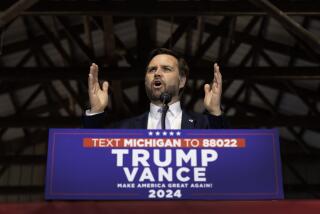Ohio voters look set to dump Republicans’ anti-union law
Reporting from Hanoverton, Ohio — An aggressive Republican drive to weaken the labor rights of government workers appears to have crested, at least in Ohio, where voters are expected to throw out a far-reaching anti-union law this week.
The referendum over collective bargaining for public employees, potentially the most important contest in off-year elections around the nation, is being closely watched for clues about shifting voter trends in a state expected to play its usual outsized role in next year’s presidential contest.
Barely seven months ago, newly elected Gov. John Kasich joined other Republican governors, including Wisconsin’s Scott Walker, in defying angry street demonstrations to push through a measure designed to curb the power of public-employee unions.
Tuesday’s vote “will reverberate in a major way across the country, because Ohio is still Ohio,” said Dale Butland of Innovation Ohio, a liberal think tank with ties to organized labor. “We are one of the linchpins of any presidential election.”
Kasich, the focus of both sides in the referendum fight, touts his blue-collar roots as the son of a postman. But he warns that a victory by organized labor would undercut his efforts to hold the line on government spending and rebuild the state’s economy.
“Look, I understand that people are nervous about this in the public sector,” he told a northeastern Ohio rally in support of the anti-union law he signed in March. But, he added, “if we want to continue on this path of pulling Ohio out of this ditch, the state of Ohio has to be responsible.”
The arguments by Kasich, whose popularity has fallen sharply since his election a year ago, appear to have swayed few voters. Public and private polling indicates that Ohioans, by a substantial margin, want to overturn the new law.
Strategists on both sides say conservative legislators and the new governor, emboldened by a Republican election sweep, overreached when they added curbs on collective bargaining to a measure requiring government workers to pay a larger share of their pension and healthcare costs.
Repeal would represent a sorely needed victory for organized labor and its Democratic allies. A related effort fell short last summer in Wisconsin, where Democrats outraged by anti-union efforts tried to change the balance of power by forcing Republican lawmakers into recall elections.
The Ohio referendum, placed on the ballot by organized labor in a petition drive that drew more than a million signatures, is focused on the law itself. Under the statute, government officials can effectively impose contract terms on public employees when they can’t come to terms over wages, the only issue subject to bargaining under the GOP overhaul.
But unlike Wisconsin, where Republicans exempted first responders from a new law stripping public employees of most collective bargaining rights, Ohio’s law applies to all government workers, including police and firefighters.
That is creating unusual alliances, with law-enforcement groups like the Fraternal Order of Police, which often endorse Republican candidates, siding with Democrats in the repeal push.
For months, an expensive TV ad campaign by the union-led coalition We Are Ohio has featured blaring sirens and on-camera testimonials by first responders warning that public safety would be at risk because the law would bar unions from negotiating for adequate staffing levels.
Rallies in support of labor’s push-back have attracted some of the white working-class voters who had abandoned the Democratic Party over the years, said Chris Redfern, chairman of the Ohio Democratic Party. Next year, when Ohio will be a major presidential election battleground, “they’re going to remember this,” he said.
President Obama’s reelection campaign is “strongly supporting” the ballot drive, Redfern said, helping recruit 12,000 volunteers, assisting with voter turnout and enabling Democrats to refurbish their organization far ahead of 2012.
But strategists in both parties caution against reading too much into the referendum results. Given the economy, even Democrats say Obama could easily lose Ohio, despite carrying it last time.
Republican pollster Neil Newhouse, who is advising the business-financed effort to retain the labor law, called it “wishful thinking” for Democrats to project the outcome onto a high-turnout presidential contest.
A Democratic advisor to the repeal campaign, speaking anonymously in order to discuss internal strategy, said voters oppose the new law out of a sense of fairness: They believe workers should be able to bargain with their bosses. In their pitch to Ohio voters, the pro-labor campaign took on the issue of restraining the power of government workers by making it about values — “the notion that we don’t turn our backs on the people who watch ours” — the advisor said.
Supporters of the law argued that government workers had received excessive healthcare and pension benefits at taxpayer expense, and ran ads declaring that “enough is enough.”
But the closing arguments by both sides converged on a common theme — jobs — rather than labor rights. In that sense, the Ohio campaign is a preview of next year’s election, which is expected to turn on a judgment by voters about which presidential candidate is better able to restore prosperity.
The labor coalition’s ads attacked the unpopular governor and the job losses it said would result from his policies.
Kasich, in a commercial filmed at a dining table, said his administration was working to keep young Ohioans from leaving the state to find work and that government workers must make reasonable sacrifices to keep Ohio from losing ground.
Last Tuesday, he ventured into the old canal town of Hanoverton for an outdoor rally that generated the biggest clash of the campaign.
Standing outside the 19th century Spread Eagle Tavern, its red-brick facade glowing in the golden late-afternoon light, the gruff-talking governor confronted about 20 demonstrators. They shouted “tea bagger,” and “traitor” when he mentioned his working-class upbringing.
Fighting to be heard over the hecklers, Kasich boasted that, as a result of his economic development efforts, “we’re beginning to win.”
“But,” yelled a man at the rear of the throng, “you’ll lose on Tuesday!”
More to Read
Sign up for Essential California
The most important California stories and recommendations in your inbox every morning.
You may occasionally receive promotional content from the Los Angeles Times.










